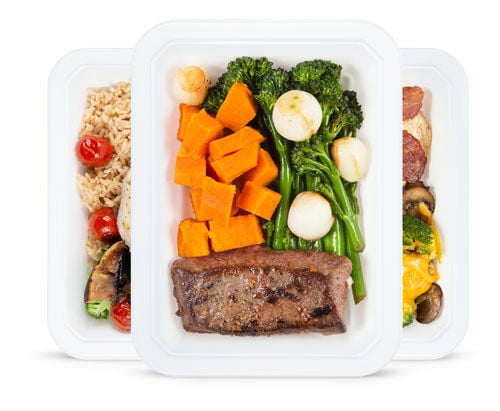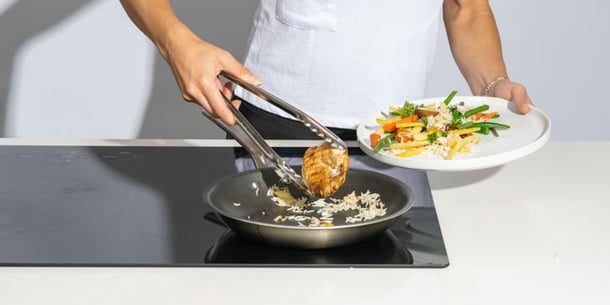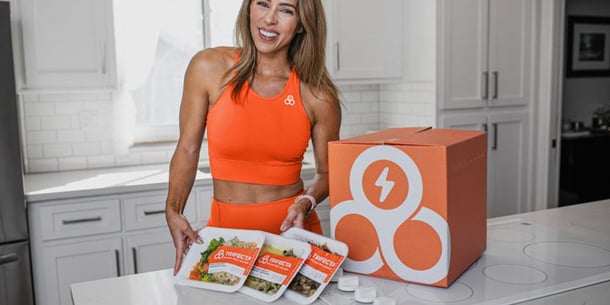When it comes to nutrition, we are all a little different. We have various fitness and health goals in mind, different food preferences, and we just aren't all built the same - there is no such thing as a one size fits all approach. But how can you tell exactly which meal plan is going to get you the most results?
How to choose the right diet
Realistically, the best diet for you is one that you can stick to.
You aren't going to get results on any diet unless you can stick to it. It is consistency over time that will help you reach your goals - not perfect eating and not a few weeks of perfect eating. Simply put, if you can stay on track most of the time and be patient, you will get there and are more likely to stay there.
While a little sacrifice is needed, getting healthy, losing weight, etc. doesn't have to be painful. And you shouldn't feel forced to eat foods you just don't enjoy. Your food preferences and how certain foods make you feel is an important consideration before going on any new eating plan. If your food is making you feel tired, bloated, or just plain awful, this could be a sign this diet is not a good fit.
Bottom line, if you're having a hard time trying to decide what meal plan fits you best, here are a few key things to keep in mind:
- Pick a diet that includes foods you enjoy eating
- Stick with a diet that makes you feel good, physically and mentally
- Choose the diet you can maintain the longest
- Be consistent and give yourself time to be successful, no matter what diet you choose
Take this simple quiz to get paired with your perfect meal plan based on your taste preferences and personal health goals.
What is the best diet to lose weight?
No matter what diet you choose, we know that weight loss is largely determined by calorie control. By eating fewer calories than you burn each day, you can lose body weight.
And while there are new theories emerging around macros and changing the way you metabolize food, like on a keto diet, a calorie deficit is still the most widely accepted approach to weight loss backed by years of research.
This is why the first step in any weight loss plan should be to determine how many calories you should be eating a day to lose weight. Then, opt for a plan that keeps your calories within this range.
If your weight-loss diet requires a low amount of calories (less than 1600 calories per day), diets that exclude multiple food groups - like keto, paleo, and vegan, maybe an easy way to eliminate more calories and promote satiating foods to control hunger. But if your calorie needs for weight loss are still relatively high (more than 2,000 calories per day), you have a little more room to work with, and just about any meal plan will get you there.
Additional considerations that may help make losing weight easier include eating a quality diet full of fiber-rich, nutrient-dense foods (fruits and veggies), and lean proteins - all of which have been shown to be foods that support weight loss in various ways.
How to lose weight in a nutshell:
- Decrease your calorie intake
- Increase your calorie burn - exercise more
Check out this guide for the top 30 weight loss diets reviewed by a dietitian.
What is the best diet for muscle gain?

When it comes to adding some muscle mass, calories, and protein needs to increase! And the quality of your calories becomes much more important since you want to add muscle weight and not body fat.
Protein is the macro that becomes muscle, so knowing how much protein to eat each day to build muscle is key. You should strive to get about 1 gram of protein per pound of lean tissue, and most will not need more than 1 gram of protein per pound of body weight total.
What about the other macros?
While increasing fat intake is one way to increase your calories without having to add too much additional food volume (since fat is the most calorically dense macro - providing twice as many calories per gram compared to protein and carbs), many experts recommend sticking to a moderate fat intake and increasing your carb and protein calories overall.
This is because, outside of a keto diet, fat is more likely to be stored as fat than any other macro in a calorie surplus. And
The best diet for muscle gain is one that includes plenty of protein and some carbs to support your fitness output, like the clean, classic and a la carte meal plans.
How to gain weight in a nutshell:
- Eat slightly more calories (10% more than your maintenance)
- Eat plenty of protein
- Do muscle-building workouts
Looking to speed things up? Check out these 7 secrets for gaining weight fast.
What is meal prep? Is it right for you?
Are you a picky eater? Or just want complete control over your meal plan? Meal prep could be for you.
Meal prepping is nothing more than preparing some or all of your meals in advance to guarantee you are eating your favorite foods and nailing your nutrition and macro goals every day. The catch, it requires a bit of culinary expertise and a little more work than getting on a set meal plan. But of course, if you are cooking all of your meals already, it could be a more strategic approach that saves you time and money in the long run.
Some things to consider if you are meal prepping on your own:
- You'll need to understand your unique calorie goals and macros
- You will have to plan a menu with recipes and shop for all of your food in advance.
- You might have to eat the same thing most days or get creative with toppings and seasonings
Opting for a meal prep delivery option like Trifecta is one way to cut down on cooking—pre-made proteins, veggies, and grains can be hand-selected, portioned out, and seasoned to your liking.
If you enjoy cooking, Trifecta's a la carte options will cut down on time but still give you enough flexibility to create any dish you choose -without having to eat the same thing every day!
How to meal prep in a nutshell:
- Calculate your calorie and/or daily macro needs
- Plan a menu that fits your nutrition goals
- Purchase and prep your meals in advance
Learn how to meal prep in 7 simple steps.
Trifecta’s Healthy Meal Plans
All meal plans at Trifecta are designed to help you hit your fitness goals and provide a balanced approach to healthy eating, using science-based nutrition - no matter which diet you choose.
Of course, not every meal plan option is right for everyone, and each diet will give you something a little different.
Weekly Meal Plans
All meal plans include already cooked, and seasoned meals (you just heat and eat) curated by our kitchen and shipped out weekly. If you want to do minimal work when it comes to your diet and just have your food sent to your door, meal plans are perfect for you!
When trying to decide which meal plan you like best or which diet plan will give you the best results, use this breakdown:
Eating Clean vs. Paleo
Which is better eating clean vs. eating paleo? Let's explore both.
Clean eating is based on a balanced approach of whole grains, lean proteins, and veggies to provide nutritious meals without any added preservatives or artificial ingredients. This meal plan is also free from dairy, and gluten and is seasoned with minimal added sodium and sugar.
Paleo is based on a more Paleolithic style of eating - essentially what a caveman would eat. This plan is whole foods-based and does not include any grains, beans, or legumes since cavemen did not have access to these foods. It is also dairy-free, and gluten-free, and has no artificial ingredients or added preservatives. Think of lots of meat, fish, and veggies with the occasional sweet potatoes.
Clean eating is best for:
- Anyone looking to clean up their diet - especially, if you've never dieted or are just getting started, this is the plan for you!
- Someone who has a lot of weight to lose.
- Those looking to build muscle or support their sport with proper nutrition
- A moderate carb, moderate protein, and lean approach to dieting
- Those who still want to enjoy grains and pasta while maintaining calorie control.
Paleo is best for:
- Those looking to cut a lot of calories
- Paleo lovers - this plan is strict paleo!
- Someone who has been on a diet for a while and needs an extra push to get past a plateau.
- Individuals who aren't doing heavy training or exercise
- A moderate fat, lower carb, and high protein approach to dieting
- Those who love meat and fish with lots of veggies
Trifecta Paleo Meal Plan Average Macros: Paleo meals contain an average of 400 calories, 32 g protein, 20 g fat, and 23 g carbs per serving.
Still not sure which is right for you? This guide on eating clean vs. paleo goes into even more detail to help you decide.
Paleo vs. Keto
Keto is the lowest-carb meal plan available, restricting carbs to less than 5% of total calories. This meal plan is also very high in fat. Because carbs are restricted so low, this plan does not include any grains, beans, or starchy veggies. And in contrast to paleo, keto does have some meals with dairy and soy but is still gluten-free.
By eliminating most of your carbs, keto allows you to use fat as your primary source of fuel and offers a different variety of foods for those that have a hard time on traditional diets. Think cheese, turkey bacon, meats, and lots of non-starchy veggies.
Keto is best for:
- Those looking to cut a lot of calories
- Someone with a lot of body fat to lose
- Individuals who aren't doing heavy training or exercise
- A high-fat, extremely low-carb, and moderate protein approach to dieting
- Those who enjoy eating rich flavors and fattier foods
Keto Meal Plan Average Macros: Keto meals contain an average of 500 calories, 35 g protein, 35 g fat, and 9 g carbs per serving.
Looking for the full breakdown? Read this article on paleo vs keto.
Vegan vs. Vegetarian
Vegan and vegetarian diets are both considered meat-free, plant-based diets with a few differences between the two.
- Vegan diets are free from all animal products, including eggs, dairy, and any animal-derived ingredient.
- Vegetarian, on the other hand, allows for dairy and egg options.
Vegan is best for:
- Strict plant-based eaters - no meat and cheese on this plan!
- Those looking to cut a lot of calories
- Anyone looking to increase their intake of veggies and plant-based foods
- A low-fat, moderate-carb, and moderate-protein approach to dieting
Vegan Meal Plan Average Macros: Vegan meals contain an average of 400 calories, 20 g protein, 18 g fat, and 50 g carbs per serving.
Vegetarian is best for:
- Plant-based eaters who are looking for a little more flexibility and nutrient-dense proteins - dairy and eggs are a great source of protein!
- Those looking to maintain weight or just clean up their diet
- Anyone looking to increase their intake of veggies and plant-based foods
- A low-fat, moderate carb and moderate-protein approach to dieting
Vegetarian Meal Plan Average Macros: Vegetarian meals contain an average of 400 calories, 20 g protein, 18 g fat, and 50 g carbs per serving.
Take a deeper dive into vegan vs vegetarian diets to decide which is a better fit for you.
Classic
A classic style of eating is based on a minimal approach with steamed whole grains or potatoes, veggies, and lean proteins. This diet has little to no added salt and seasonings and offers a consistent approach to eating - you know exactly what you are getting with a few variables. And just like the other meal plans, it is ready just to heat and heat!
However, these dishes are selected one meal at a time and shipped out on a reoccurring basis (if you want to change it up, you'll need to change your order each week).
Classic is best for:
- Picky eaters who want to season their food themselves or eat a plain diet
- Those with multiple food allergies or intolerances
- Those looking to cut a lot of calories or need more consistency in their diet
- Athletes or those who need more control of their macros and nutrition
- A very lean, protein-rich, and moderate carb approach to dieting.
Meal Prep Plan
If you are looking to have even more flexibility in what food you get, a meal prep plan using individual proteins, carbs, and veggies might be best for you.
All meal prep options are pre-cooked and ready to be portioned out or tossed into your favorite recipes. They come with almost no added salt and seasoning, and you pick and choose exactly what you want each week. And similar to the
This plan is perfect for anyone following a macro-based diet.
Trifecta Meal Prep is best for:
- Families who need larger portions to divvy out and want to cut back on cooking time
- Anyone who still wants to cook some of their favorite dishes or meal prep out their favorite recipes
- Serious meal preppers - eliminate all planning, shopping, and cooking time, but still mix and match your meals with more variety and tightly controlled nutrition.
- Picky eaters who want to season their food themselves or eat a plain diet
- Those with multiple food allergies or intolerances
- Those looking to lose weight or gain muscle
- Athletes or those who need more control of their macros and nutrition
- A very lean, protein-rich, and moderate carb approach to dieting.
Getting started on your diet
Once you've found the best diet for you, make a plan to stick to it. Stay consistent for at least a few weeks with minimal cheat meals and then reevaluate how you feel, and how well you are doing reaching your health and fitness goals. Change doesn't happen overnight, and you may not get your perfect diet on the first go around. In addition, as you continue on your health journey, keep in mind your needs may change.
If you've still got some unresolved questions, check out our FAQ page. Or reach out to our amazing customer success team.
Whether you're looking to slim down or bulk up, these free toolkits make it easier to accomplish your goal with recipes, calculators, printable trackers, and more. Grab yours today!




.jpeg?width=690&name=Trifecta-Blog-178%20(1).jpeg)


.jpeg?width=610&name=Trifecta-Blog-25%20(1).jpeg)

